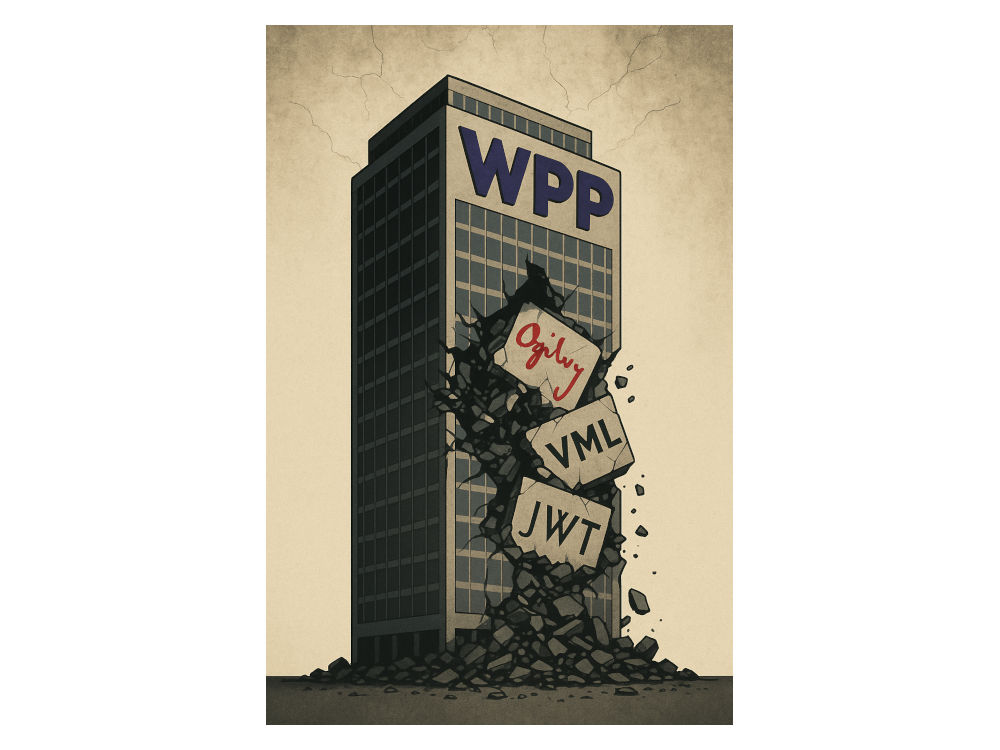The Latin phrase procidens praedam means “falling prey”. WPP, once the world’s largest advertising conglomerate, seems to have fallen prey—to a powerful external narrative.
This is evident in its decision to appoint Cindy Rose as the new CEO, replacing Mark Read, effective September 1, 2025. The company announcement reads:
“She has spent the last nine years in senior leadership positions at Microsoft where she is currently Chief Operating Officer, Global Enterprise. In this role she helps the world’s largest companies use digital technology and AI to drive business transformation.”
The emphasis on AI and digital transformation is unmistakable. And unsurprisingly, the reactions to her appointment have been mixed.

[WPP is banking on Cindy Rose’s AI magic]
Mark Read, who served as CEO for seven years, sought to simplify the company and deliver efficiencies—often through internal restructuring and merging operating units. WPP’s storied brands like J Walter Thompson were absorbed or eliminated. Media operations were consolidated. All this, guided by financial models (and, as the joke goes, creative uses of Excel).
Yet the results were underwhelming. WPP’s market cap, which peaked at £18.5 billion in February 2017, now stands at £4.2 billion—an erosion of nearly 75% in eight years. The stock trades at levels last seen in 2009. Revenues have remained flat or declined. The markets appear unconvinced—and perhaps rightly so.
Listening to the Loudest Voice
At the same time, the AI drumbeat has grown louder. Whether or not the tech works to the extent claimed, it has seized the imagination of boardrooms. Across industries—from marketing to legal, medical to manufacturing—AI is touted as the great disrupter. And WPP’s board appears to have aligned itself with this belief by hiring a seasoned tech executive to lead the transformation.
A closer look at the board helps explain the move. Of the 11 non-executive directors (excluding Read), five have tech or telecom backgrounds, two come from finance, one from consulting, one from pharma, one from the non-profit sector, and only one has a background in corporate marketing. Not a single board member comes from the marketing services industry.
It’s not hard to see how this group may have talked itself into pursuing a bold, tech-led reset.
But as the old ad line goes: WPP, it’s different.
A Company Built by an Accountant
David Ogilvy once called Martin Sorrell “that odious little jerk” when Sorrell launched a hostile bid for Ogilvy in 1989. Sorrell had started with the Saatchi brothers, then acquired a small listed UK company—Wire & Plastic Products—in 1985. From there, he built a global giant through acquisitions: JWT, Ogilvy, Y&R, and many more.
WPP has always been a financial construct—a holding company, not an operating one. Its subsidiaries serve the clients. And most of these companies had rich, independent cultures long before they were acquired. These cultural foundations persist even today, sometimes at odds with the parent company’s financial logic.
Recent efforts to merge and streamline operations were meant to simplify and unify. But it’s unclear if that has worked—or even whether it can. Culture trumps financial engineering. And WPP, as a shell, lacks a unifying culture of its own.
Can AI Be a Strategy?
Into this complex milieu comes a new CEO, whose primary credential is expertise in a powerful tool: AI. But a tool is not a strategy. And tools imposed from the outside—especially by a parent company that operates at a financial remove—often fail to take root. Culture cannot be dictated. Trials without commitment do not work.
Marketing Services is a deeply nuanced business. It runs on creative excellence, deep domain knowledge, and the ability to solve client problems with empathy and insight. Technology plays a role—but this is not a technology business.
WPP’s strength lies not at the holding company level, but in its operating units. And most of them are likely already using AI where it matters. That’s what makes the Cindy Rose appointment seem more like a signal to the markets than a genuine internal transformation plan.
A Company in Play?
Which brings us to another Latin phrase: Videte Tribulationis—watch out for trouble.
By tying its fate to an external narrative, the WPP board may have unintentionally put the company “into play,” in market parlance. Already there is speculation that Accenture may acquire WPP. Publicis may reconsider a merger, having failed earlier with Omnicom. Japanese pride may drive Dentsu to make a bid to gain global scale. Or, more likely, WPP could be broken up—its parts worth more than the whole.
For the sake of the 110,000 people who work at WPP, I hope I am wrong.
Dig Deeper
Thompson ad mortem. Who cares: Why did WPP decide to snuff out the identities of three of its most storied agencies—Thompson, Y&R and Wunderman—to create a new entity VML, the world’s largest creative company? The clues lie in the stock markets—and the immense pressures acting on its CEO Mark Read
The new mad men in town The global merger of JWT and Wunderman is a signal of how a new combination of techies and fuzzies might dominate the world of innovation and marketing

